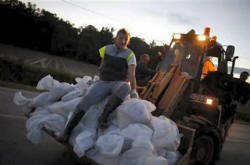|
 Floods
Menace Towns, Power Plants In Serbia And Bosnia Floods
Menace Towns, Power Plants In Serbia And Bosnia
 Send a link to a friend
Send a link to a friend
[May 19, 2014]
By Fedja Grulovic and Daria Sito-Sucic
OBRENOVAC, Serbia/MAGLAJ, Bosnia (Reuters)
- Communities in Serbia and Bosnia battled to protect towns and power
plants on Monday from rising flood waters and landslides that have
devastated swathes of both countries and killed dozens of people.
|
|
 Receding waters in some of the areas worst-hit by the heaviest
rainfall in the Balkans since records began 120 years ago revealed
scenes of devastation - twisted homes, fallen trees and rotting
animals. Receding waters in some of the areas worst-hit by the heaviest
rainfall in the Balkans since records began 120 years ago revealed
scenes of devastation - twisted homes, fallen trees and rotting
animals.
Authorities in Bosnia estimated some 500,000 people had been
evacuated or left their homes, the kind of human displacement not
seen since the country's 1992-95 war. The discovery of a body in the
north of the country on Monday raised the regional death toll to at
least 38.
At least 25,000 people have been evacuated in Serbia.
The River Sava, swollen by a new flood wave from Croatia a day after
the rain finally stopped, continued to threaten parts of northern
Bosnia and western Serbia, including Serbia's biggest power plant 30
km (18 miles) southwest of the capital, Belgrade.
Soldiers and energy workers worked through the night to build
barriers of sandbags to keep the water back from the site and from a
second complex, the Kostolac coal-fired plant, east of Belgrade.
 Hundreds of volunteers in the capital filled sandbags and stacked
them along the banks of Sava. Police issued an appeal for more bags.
Djina Trisovic, a union spokeswoman at Serbia's EPS power utility,
said some workers at the Nikola Tesla plant had worked three days
with barely a break because their relief teams could not reach the
plant.
"The plant should be safe now," she told Reuters. "We've done all we
could. Now it's in the hands of God."
'THE MOUNTAIN HAS STARTED TO SLIDE'
The plant covers roughly half of Serbia's electricity needs. Parts
were already shut down as a precaution, and it would have to be
powered down completely if the waters breached the defenses.
Other EPS officials also said they believed the plant was out of
danger, but there was concern for the Kolubara coal mine that
supplies it.

[to top of second column] |

Hundreds of landslides have caused havoc, particularly in
mountainous Bosnia, where the Sava has devastated farmland that is a
mainstay of the economy. The river continued to overwhelm ad hoc
flood defenses both there and in Serbia.
In the northern Bosnian region of Tuzla, mayor Jasmin Imamovic said
volunteers and emergency services were digging channels to divert
water that had formed small lakes and triggered landslides, burying
at least 15 houses and threatening others.
Seven tons of rotting livestock were removed from the central
Serbian town of Svilajnac, state news agency Tanjug reported.
On the Serbian-Bosnian border, the town of Mali Zvornik on the River
Drina was also in danger.
"The mountain has practically started to slide into the Drina,"
Predrag Maric, the Serbian police's head of emergency situations,
told Radio B92, "with the potential to create a natural dam that
would divert the Drina towards Mali Zvornik and flood it."
(Additional reporting by Ivana Sekularac and Matt Robinson in
Belgrade, Maja Zuvela in Sarajevo, Igor Ilic and Zoran Radosavljevic
in Zagreb; Writing by Matt Robinson; Editing by John Stonestreet)
[© 2014 Thomson Reuters. All rights
reserved.] Copyright 2014 Reuters. All rights reserved. This material may not be published,
broadcast, rewritten or redistributed.
 |